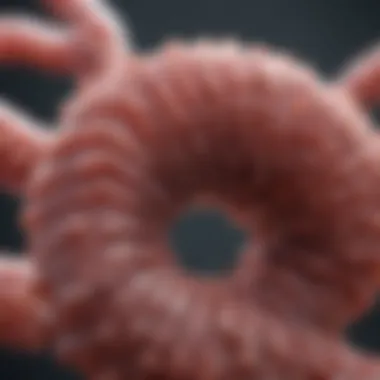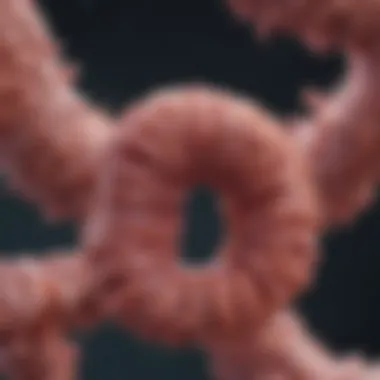T3 Colon Cancer Treatment: Options and Strategies


Intro
The treatment of T3 colon cancer can be a complex journey. This stage indicates that the tumor has invaded through the muscularis propria into the surrounding tissues, but has not metastasized to distant sites. Addressing treatment options requires a comprehensive understanding of the disease and its implications. This article aims to explore clinical staging, the impact of tumor invasion, and the latest therapeutic strategies. We will also consider the integration of personalized medicine and multidisciplinary care in optimizing treatment outcomes for patients.
Research Overview
Summary of Key Findings
Research in T3 colon cancer treatment has revealed several critical findings. The most effective treatment typically involves a combination of surgical resection, chemotherapy, and possibly radiation therapy, depending on the tumor's characteristics. Recent studies emphasize the importance of personalized medicine, taking into account the individual patient's tumor biology and genetic profile. This tailored approach enhances treatment effectiveness and minimizes unnecessary side effects.
Importance of the Research in Its Respective Field
Understanding T3 colon cancer is vital for improving prognosis and survival rates. As treatment options evolve, ongoing research contributes to more effective therapies and better patient management. The integration of clinical practices, scientific research, and emerging technologies is essential in addressing the challenges posed by this disease.
Methodology
Description of the Experimental or Analytical Methods Used
Clinical studies often utilize randomized controlled trials to assess the efficacy of various treatment modalities. These studies may compare conventional chemotherapy regimens with targeted therapies or immunotherapies. Data is gathered through clinical assessments, imaging techniques, and biomarker analyses to evaluate treatment responses and outcomes.
Sampling Criteria and Data Collection Techniques
Patient selection for studies typically involves specific criteria. Inclusion factors might include age, overall health, tumor staging, and previous treatment history. Data collection methods include patient surveys, clinical evaluations, and laboratory tests to track treatment progress and long-term effects.
"The key to successful T3 colon cancer management lies in understanding the tumor's biology and the patient's unique context."
Finale
The management of T3 colon cancer requires a nuanced and informed approach. With advancements in therapeutic strategies and a strong emphasis on personalized medicine, the prognosis for patients continues to improve. Ongoing research and clinical trials will shape the future of treatment protocols and enhance the quality of care.
Understanding Colon Cancer
Understanding colon cancer is essential for both medical professionals and patients. This knowledge lays the groundwork for recognizing the severity, implications, and treatments for various stages of the disease. T3 colon cancer, where tumors penetrate deeper into the layers of the colon, requires a careful assessment of clinical and pathological features—an understanding that informs treatment decisions and patient outcomes.
Definition and Epidemiology
Colon cancer, also known as colorectal cancer, originates in the lining of the colon or rectum. It typically begins as small, benign growths known as polyps, which can gradually become malignant over time. The epidemiology of colon cancer reveals it as one of the most common cancers worldwide. According to the World Health Organization, colon cancer ranks as the third most diagnosed cancer globally. Factors such as age, diet, lifestyle, and genetic predisposition play significant roles in its development.
- The incidence rate of colon cancer is highest among individuals aged 50 and older.
- Increased rates are observed in regions with Western lifestyle patterns, particularly where diets are rich in meat and low in fiber.
- Family history of colorectal cancer enhances risks of developing the disease.
Pathophysiology of Colon Cancer
The pathophysiology of colon cancer involves several biological processes. Understanding these factors is crucial to grasp how T3 stage arises.
- Tumor growth begins when normal colon cells undergo genetic mutations that enable abnormal growth and division.
- As the cancer evolves, malignant cells invade surrounding tissues and may metastasize to distant organs through the lymphatic system or bloodstream.
- At the T3 stage, the tumor invades the muscularis propria but has not yet spread outside the colon wall. This specific invasion pattern involves the depth of the cancer and guides treatment choices.
Staging of Colon Cancer
Staging is a key factor in colon cancer management, providing insight into the extent of disease and indications for treatment. The most commonly used system for staging is the TNM classification, which considers Tumor size (T), Node involvement (N), and Metastasis (M).
- Stage T3 indicates that the tumor has penetrated the bowel wall into surrounding tissues.
- Nodal involvement is assessed via imaging and sampling to identify whether cancer has spread.
- Accurate staging influences treatment plans, guiding whether surgery, chemotherapy, or radiation therapy is most appropriate.
"Accurate staging is crucial for effective treatment and predicting patient outcomes in colon cancer."
Understanding these components is vital, as it sets the stage for discussions on treatment strategies for T3 colon cancer.
T3 Colon Cancer Explained
Understanding T3 colon cancer is critical for patients and healthcare providers alike. This stage signifies a specific depth of tumor invasion into the colon wall, which has implications for treatment strategies and outcomes. By comprehensively exploring T3 colon cancer, we can grasp the unique characteristics that distinguish this stage from others, allowing for informed decisions regarding therapeutic interventions. The insights gained from examining these aspects can empower patients and enhance patient-centered care.
Characteristics of T3 Stage


The T3 stage of colon cancer is characterized by the tumor having invaded through the muscularis propria into the subserosa or into the tissue surrounding the colon. It is crucial to note that while the tumor has penetrated beyond the innermost layers, there is no evidence of distant metastasis at this stage. This localized invasion can significantly influence treatment options.
- Tumor Size and Growth: T3 tumors can vary in size, which can affect the chosen treatment plan. Larger tumors may require more extensive surgical approaches.
- Invasion Depth: In T3, invasion is not limited to the muscle layer itself, indicating a more aggressive disease that necessitates careful management.
- Lymph Node Involvement: The characteristics of regional lymph nodes must be assessed as they play a role in determining the overall treatment approach.
Identifying T3 stage colon cancer typically involves imaging tests, such as a CT scan or MRI, along with endoscopic evaluations, providing a comprehensive picture of tumor spread.
Prognosis of T3 Colon Cancer
The prognosis for individuals diagnosed with T3 colon cancer can vary based on several factors. Understanding these factors is essential in guiding treatment decisions and providing realistic expectations.
- 5-Year Survival Rate: Generally, the 5-year survival rate for T3 colon cancer is better than advanced stages but varies widely depending on lymph node involvement and overall health of the patient.
- Staging and Treatment Response: How well the cancer responds to initial treatment can further influence prognosis. Patients who respond positively to chemotherapy and surgical interventions typically experience better outcomes.
- Personal Health Factors: Age, comorbidities, and overall physical condition can also impact prognosis. Younger patients without significant health issues tend to have a better outlook than older patients with multiple health concerns.
Studies indicate that early detection, coupled with appropriate treatment, can greatly improve the prognosis in T3 colon cancer cases.
In summary, understanding the characteristics and prognosis of T3 colon cancer provides valuable insights for treatment pathways and informed decision-making.
Standard Treatment Options for T3 Colon Cancer
The treatment of T3 colon cancer involves a structured approach that aims to maximize patient outcomes while minimizing potential complications. This section outlines the standard treatment modalities which are pivotal in managing this stage of the disease. With a combination of surgical, chemotherapy, and radiation therapy options, healthcare providers can tailor interventions to the specific needs of each patient, ensuring a more personalized and effective treatment plan.
Surgical Interventions
Surgical intervention serves as the cornerstone of treatment for T3 colon cancer. The primary goal is to remove the tumor along with surrounding affected tissues.
Types of Surgical Procedures
Surgical options for T3 colon cancer include colectomy and, in some cases, partial resection. Colectomy involves the complete removal of the colon segment containing the tumor. This procedure is preferred due to its definitive nature in eliminating cancerous tissues.
A distinct benefit of colectomy is its potential to significantly reduce the risk of cancer recurrence, making it a popular choice among clinicians. However, it is important to consider possible drawbacks, such as prolonged recovery time and complications like infection or bowel obstruction.
Preoperative Considerations
Preoperative assessments are crucial in optimizing surgical outcomes. These can include imaging studies, laboratory tests, and consultations with specialists. The key characteristic of preoperative preparations is that they help identify any potential risks associated with surgery, ensuring the appropriate measures are in place before the procedure.
One unique feature of preoperative evaluations is the optimization of comorbid conditions. By addressing these before surgery, the overall safety of the procedure increases. However, this process may prolong the time before treatment begins, which can sometimes be a disadvantage in cases where timely intervention is essential.
Postoperative Care
Postoperative care involves monitoring patients after surgery to manage complications and promote recovery. This aspect is critical in the overall treatment success. Effective postoperative care includes pain management, nutritional support, and monitoring for signs of infection.
The unique feature of postoperative protocols is their personalized nature, allowing adjustments according to each patient's recovery. While this targeted care helps improve outcomes, it can also burden healthcare resources.
Chemotherapy Regimens
Chemotherapy plays a significant role in the treatment of T3 colon cancer, often used in conjunction with surgery. This approach aims to eliminate residual cancer cells and reduce recurrence risk.
Adjuvant Therapy Approaches
Adjuvant therapy involves administering chemotherapy after surgical intervention. This is an essential strategy because it targets any remaining cancerous cells that may not have been removed during surgery. It offers a systematic approach to further reduce recurrence risk.
The primary advantage of adjuvant therapy is its proven effectiveness in improving survival rates among patients. However, it can also lead to side effects that need careful management.
Commonly Used Chemotherapeutic Agents
Common agents include fluorouracil, leucovorin, and oxaliplatin, typically used in various combinations. These medications are chosen for their efficacy in targeting colon cancer cells.
The benefit of using these agents lies in their established track records in improving outcomes for T3 patients. Still, challenges such as potential toxicity and the need for dose adjustments must also be considered in treatment planning.
Radiation Therapy
Radiation therapy serves a complementary role, particularly in managing locoregional disease. Its application pre- or post-surgery can aid in enhancing treatment effectiveness.
Indications for Radiation


Radiation therapy may be indicated in cases where the tumor is close to the margins of resection or if lymph nodes are affected. Its role is to reduce the likelihood of local recurrence.
One key advantage of radiation is its ability to target cancerous tissues while sparing healthy ones, but it may not be suitable for all patients, mainly due to side effects or individualized treatment plans.
Techniques and Equipment
Modern techniques, including intensity-modulated radiation therapy and stereotactic body radiation therapy, enhance the ability to deliver targeted doses precisely. These advancements improve patient outcomes by minimizing side effects and improving comfort.
The unique feature of these techniques is their adaptability to the patient's specific anatomy and pathology. However, access to advanced equipment can vary among treatment centers, impacting patient options.
Overall, standard treatment options for T3 colon cancer integrate surgical techniques, chemotherapy, and radiation therapy to provide a comprehensive approach. By considering the specific characteristics of each patient, healthcare professionals can create targeted, effective management strategies.
Emerging Treatment Modalities
Emerging treatment modalities play a significant role in shaping the future of T3 colon cancer management. As researchers develop new approaches, the landscape of available therapies evolves. These modalities often address the limitations of traditional treatments and aim to cater to the unique characteristics of individual tumors.
In this section, we will explore targeted therapies, immunotherapy, and personalized medicine approaches. Each subheading will shed light on how these innovative treatments can enhance patient outcomes and improve the overall care process. The focus will also be on their benefits, ongoing research efforts, and practical considerations when integrating them into existing treatment protocols.
Targeted Therapy
Targeted therapy represents a sophisticated treatment approach that aims at specific molecular targets associated with T3 colon cancer. This treatment can be less damaging to normal cells compared to conventional chemotherapy.
Mechanisms of Action
The key characteristic of the mechanisms of action for targeted therapies is their precision. They primarily interfere with the proteins that contribute to cancer cell growth and survival. By blocking these signals, targeted therapies can effectively halt tumor progression. A notable example is the use of monoclonal antibodies, which target specific antigens on cancer cells. The unique feature of this action is that it minimizes collateral damage to healthy cells. However, it can lead to challenges in determining the appropriate targets for each patient's tumor.
Current Research and Trials
Current research and trials in targeted therapy reveal promising results in treating T3 colon cancer. Some trials focus on combination therapy, which analyzes how these treatments interact with existing chemotherapy options. The key aspect of this ongoing research includes determining optimal dosing schedules and patient selection. Unique studies have shown diverse outcomes based on genetic profiling. The advantage is potential improved responses in patients with specific genetic markers. But one disadvantage is that this approach may not be applicable to all patients.
Immunotherapy
Immunotherapy harnesses the immune system to combat cancer. This treatment has gained traction in recent years due to its ability to create a tailored immune response against tumors.
Principles of Immunotherapy
The principles of immunotherapy are based on stimulating the body's immune system to recognize and attack cancer cells. This is a beneficial choice because it can lead to lasting effects, as the immune system can remember how to target cancer cells. One of the main unique features is the use of checkpoint inhibitors, which enhance immune response against tumor cells. However, suitability for immunotherapy can vary greatly among patients, depending on genetic factors and tumor characteristics.
Clinical Efficacy
Clinical efficacy of immunotherapy in T3 colon cancer is an area of extensive investigation. Initial findings indicate significant effectiveness in certain patient populations. The key characteristic is the ability to prolong survival in patients who have limited options. Clinical trials continue to explore response rates, with some showing particularly encouraging results for specific immune therapies. An important advantage is its potential to create a long-term remission. However, immunotherapy might lead to immune-related adverse effects, which requires careful assessment and management.
Personalized Medicine Approaches
Personalized medicine approaches aim to customize medical treatment based on the individual patient’s characteristics. This field is steadily advancing, offering tailored strategies for treating T3 colon cancer.
Genetic Profiling
Genetic profiling is a critical component in personalizing treatment plans. This approach allows clinicians to identify specific mutations that drive tumor growth. The benefit of this profiling is that it helps direct targeted therapies more accurately. Unique features include identifying patients who may benefit from specific drugs based on their genetic makeup. Nevertheless, there can be limitations, as not all patients may have accessible profiling options or clear pathways relating to their mutations.
Tailoring Treatment Plans
Tailoring treatment plans is about integrating findings from genetic profiling into clinical decisions. This targeted approach is beneficial as it enhances the likelihood of treatment success. The unique aspect here is that it considers individual patients' responsiveness to different therapies. One advantage of tailored plans is optimizing resources and funds toward effective therapies. However, the challenge lies in the complexity of treatment choices and the need for ongoing monitoring.
Managing Side Effects of Treatment
Managing side effects of treatment is crucial for patients with T3 colon cancer. Treatments like surgery, chemotherapy, and radiation can lead to a range of unwanted effects. Understanding these side effects can help in creating effective management strategies. Moreover, addressing these issues can significantly improve a patient's quality of life. It provides insight into the treatment process and can lead to better adherence to the prescribed regimens.
Common Side Effects
T3 colon cancer patients often experience several common side effects due to their treatment. These can include:
- Fatigue: A persistent feeling of tiredness that does not improve with rest. This can affect daily activities and overall well-being.
- Nausea and Vomiting: These symptoms can stem from chemotherapy. They may prevent patients from eating properly, leading to weight loss and malnutrition.
- Diarrhea: Often, patients undergoing treatment may face gastrointestinal disturbances. This can lead to discomfort and dehydration if not addressed.
- Pain: Surgical interventions can result in acute or chronic pain. Pain management is essential to ensure recovery and comfort.
- Changes in Appetite: Patients often report alterations in their food preferences or cravings, which can complicate nutrition intake.


Awareness of these side effects is important. It prepares the patient, making them feel more in control of their treatment journey.
Supportive Care Strategies
Supportive care strategies play a significant role in alleviating side effects experienced during treatment. Implementing these strategies can improve the patient’s experience significantly. Here are some effective methods:
- Nutritional Support: Consulting a dietitian can help in planning meals that meet the patient's needs while managing symptoms like nausea or diarrhea.
- Medication: Prescribing anti-nausea medications and pain relievers can be very effective for managing side effects. Regular assessment by health professionals is vital to adjust medications as needed.
- Physical Activity: Gentle exercise can combat fatigue and improve mood. Simple activities like walking can enhance physical fitness and mental well-being.
- Emotional Support: Engaging in support groups or talking to counselors can help address anxiety or depression linked to the cancer journey.
- Hydration Management: Ensuring adequate hydration is essential, especially when experiencing diarrhea or vomiting. This may include oral rehydration solutions or intravenous fluids in severe cases.
"A multidisciplinary approach is key to managing side effects effectively. It ensures that patients receive holistic care tailored to their needs."
By employing these supportive care strategies, patients can navigate the challenges posed by their treatment. Understanding and addressing side effects can truly impact their quality of life during this difficult time.
Multidisciplinary Approach to Treatment
A multidisciplinary approach in T3 colon cancer treatment recognizes that effective management requires collaboration among various healthcare professionals. This strategy is crucial because colon cancer treatment is complex, involving multiple interventions that often require specialized knowledge. The significance of this approach lies in its ability to provide comprehensive care that addresses not only the physical aspects of the disease but also the emotional and psychological needs of the patient.
The benefits of a coordinated method include improved patient outcomes, enhanced quality of life, and more efficient use of healthcare resources. By collaborating closely, the team can develop a tailored treatment plan that considers each patient’s unique circumstances, including tumor characteristics, overall health, and personal treatment preferences.
Each member of the care team brings specific expertise. Surgeons handle surgical interventions, oncologists manage chemotherapy and radiation options, while nurses provide essential support and education to patients and families. This interprofessional collaboration significantly reduces the chance of miscommunication, ensuring all aspects of care are aligned with the treatment goals.
Moreover, regular team meetings can facilitate case discussions, allowing members to share insights, debate best practices, and adjust treatment plans as necessary. These meetings reinforce a unified treatment philosophy, essential for tackling the challenges presented by T3 colon cancer.
Coordinated Care Teams
Coordinated care teams play a vital role in managing T3 colon cancer. These teams typically consist of a range of specialists: surgical oncologists, medical oncologists, radiation oncologists, pathologists, and specialized nurses, among others. Each professional's contributions are pivotal in shaping a cohesive treatment strategy tailored to the individual patient.
Some components of coordinated care include:
- Surgical consults to assess the best possible surgical options and the timing of surgery in relation to other treatments.
- Chemotherapy scheduling that minimizes complications and optimizes drug effectiveness in conjunction with surgical recovery.
- Radiation planning to ensure precise targeting of tumor cells while sparing surrounding healthy tissue.
Effective communication is essential within the team. The use of electronic health records enhances this, allowing instant access to patient data, treatment history, and current health status.
Role of Nutrition and Lifestyle Modifications
Incorporating nutrition and lifestyle modifications proves important in the comprehensive treatment of T3 colon cancer. Evidence shows that well-balanced nutrition can improve treatment responses and reduce side effects. Oncologists often refer patients to dietitians who specialize in oncology. These experts tailor meal plans that meet individual caloric and nutritional needs, specifically designed to support the body's recovery processes.
Lifestyle modifications may include:
- Regular physical activity to improve physical condition and potentially enhance treatment tolerance.
- Stress management techniques to support emotional health, like mindfulness or counseling sessions.
"Nutrition is not just a supplement to cancer treatment; it plays a critical role in overall recovery and well-being."
The importance of addressing lifestyle choices becomes clear when research indicates that obesity and poor diet may negatively affect treatment outcomes. Thus, educating patients about these factors is paramount. Support groups can also help patients stick to their modified lifestyle choices, fostering a sense of community and encouragement.
Overall, a multidisciplinary approach empowers healthcare providers to offer a holistic treatment plan that encompasses not just medical interventions, but also essential lifestyle changes, ensuring an integrative pathway towards recovery.
Future Directions in T3 Colon Cancer Treatments
Future directions in T3 colon cancer treatments encompass the ongoing evolution in various therapeutic approaches and methodologies. Тis area is crucial, not only for improving patient outcomes but also for reshaping the future landscape of oncological care. As research continues, innovative strategies can lead to enhanced effectiveness in treatments and patient management. The integration of advanced technology is also significant, enabling more precise targeting of therapies while minimizing adverse effects.
Innovations in Surgical Techniques
Surgical techniques have seen substantial innovations, which significantly affect the treatment outcomes of T3 colon cancer. Minimally invasive approaches, such as laparoscopic and robotic surgery, have become more prevalent. These techniques offer the benefit of shorter recovery times and less postoperative discomfort. In some cases, preoperative imaging techniques like advanced MRI or CT scans enhance surgical planning, allowing surgeons to devise more targeted strategies.
Furthermore, surgical oncologists are increasingly adopting organ-sparing techniques when feasible. For instance, local excisions may be considered for small, localized tumors, thereby preserving more of the functional colon. As surgical methods continue to improve, research into enhanced recovery protocols and perioperative care is expected to yield positive results in patient recovery and overall satisfaction
Advancements in Drug Development
Recent advancements in drug development have yielded significant progress in the treatment landscape for T3 colon cancer. The exploration of novel chemotherapeutic agents and targeted therapies shows promise. Medications such as regorafenib and trifluridine-tipiracil are becoming more commonly used, particularly in refractory cases. Researchers also focus on combining therapies to optimize treatment efficacy and to potentially overcome resistance mechanisms among tumors.
Another area of focus is the ongoing assessment of biomarker-driven therapies. Understanding the unique characteristics of a patient’s tumor can lead to more personalized treatment protocols. For example, using biomarkers for HER2 expression could inform the usage of targeted therapies, aiding in significantly more effective treatment strategies.
Integration of Technology in Treatment Plans
Technology plays a pivotal role in shaping the future of T3 colon cancer treatment plans. Enhanced imaging technologies offer more accurate tumor assessments, leading to better-targeted therapies. Additionally, telemedicine has gained traction as a means to increase access to specialized care for patients. Virtual consultations allow oncologists to monitor patient progress and make adjustments in real time, thereby improving overall treatment management.
Moreover, artificial intelligence is paving the way for more robust data analysis in clinical settings. By evaluating large datasets, AI can identify patterns and predict patient responses to treatments. Such developments can lead to improving therapeutic algorithms, ultimately aiding physicians in making more informed decisions regarding patient care.
"The integration of technology into treatment plans is not just about convenience; it fundamentally improves the way we understand and tackle cancer."







